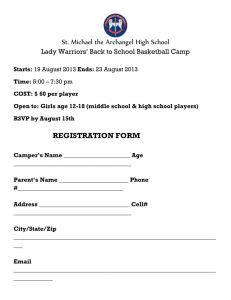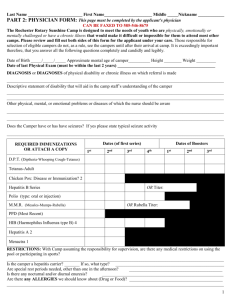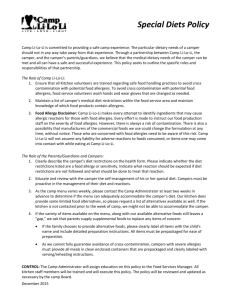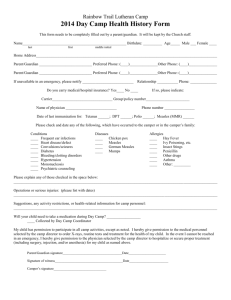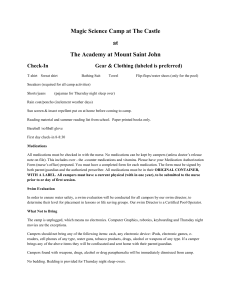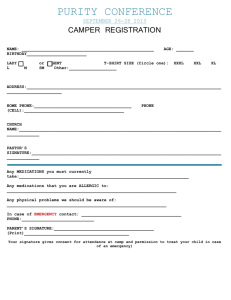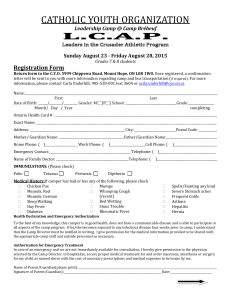Emergency Procedures - CAMP KEE-MO-KEE
advertisement
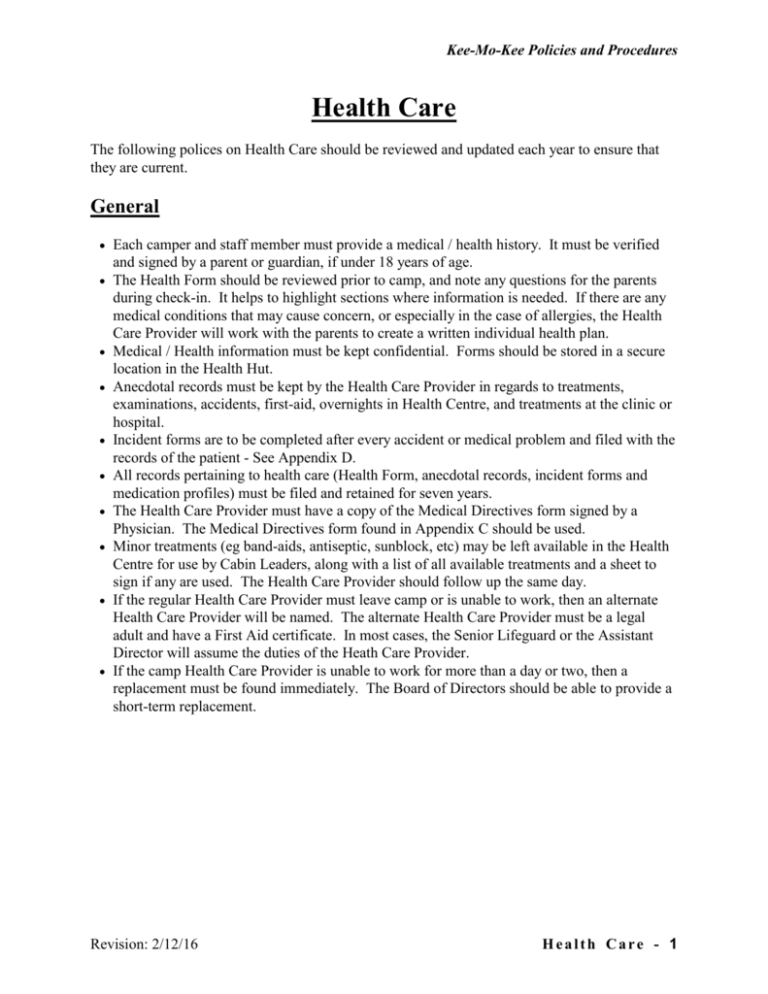
Kee-Mo-Kee Policies and Procedures Health Care The following polices on Health Care should be reviewed and updated each year to ensure that they are current. General Each camper and staff member must provide a medical / health history. It must be verified and signed by a parent or guardian, if under 18 years of age. The Health Form should be reviewed prior to camp, and note any questions for the parents during check-in. It helps to highlight sections where information is needed. If there are any medical conditions that may cause concern, or especially in the case of allergies, the Health Care Provider will work with the parents to create a written individual health plan. Medical / Health information must be kept confidential. Forms should be stored in a secure location in the Health Hut. Anecdotal records must be kept by the Health Care Provider in regards to treatments, examinations, accidents, first-aid, overnights in Health Centre, and treatments at the clinic or hospital. Incident forms are to be completed after every accident or medical problem and filed with the records of the patient - See Appendix D. All records pertaining to health care (Health Form, anecdotal records, incident forms and medication profiles) must be filed and retained for seven years. The Health Care Provider must have a copy of the Medical Directives form signed by a Physician. The Medical Directives form found in Appendix C should be used. Minor treatments (eg band-aids, antiseptic, sunblock, etc) may be left available in the Health Centre for use by Cabin Leaders, along with a list of all available treatments and a sheet to sign if any are used. The Health Care Provider should follow up the same day. If the regular Health Care Provider must leave camp or is unable to work, then an alternate Health Care Provider will be named. The alternate Health Care Provider must be a legal adult and have a First Aid certificate. In most cases, the Senior Lifeguard or the Assistant Director will assume the duties of the Heath Care Provider. If the camp Health Care Provider is unable to work for more than a day or two, then a replacement must be found immediately. The Board of Directors should be able to provide a short-term replacement. Revision: 2/12/16 Health Care - 1 Kee-Mo-Kee Policies and Procedures Medications Medication must be administered by a qualified Health Care Provider, being either a Physician, R.N., R.N.A., or a designate who is at least 19 years of age, holding one of the following first-aid certificates: o St. John’s Ambulance Association Standard First-aid certificate o Canadian Red Cross Society’s Standard First-aid certificate o A certificate that the Ministry of Health deems to be equivalent to the above. All medications must be given to the camp Health Care Provider at the beginning of camp, clearly labelled with the camper’s name and dosage. This includes over the counter medications such as pain relievers, laxitives, etc. This also includes medication for Staff members. Medications must be locked up in the cupboard in the Health Centre at all times when the camper is on-site. In general, the campers should be directed to go to the health hut to be given medication at the appropriate time. In case of out-trips, the medication must be carried and administered by the Health Care Provider or a qualified delegate (see the first point above for qualifications). In the case of a camper with a severe allergy, the child’s Epi-Pen may be kept by the child (if they are old enough) or the Cabin Leader. It is recommended that parents be notified before any unscheduled medication is given to a camper. The Health Care Provider must document all medications administered. A medication profile (see appendix E) should be used to keep track of proper administration. Profiles should be kept in a binder and divided into cabin groups. It is the responsibility of the Health Care Provider to inform Cabin Leaders of medications required by their campers, and the times they need to be at the Health Centre. Lice A lice check must be done to each camper during check-in. Toothpicks should be used to pick through hair, use a new one for each camper. Lice and nits are most often found at the nape of the neck or behind ears, but they can be found over the entire head. If lice are found the camper will be sent home. The camper may not be re-admitted until they have a doctor’s note saying the lice and nits are gone. Public Health numbers should be posted during check-in for parent’s benefit and information. (note - get some numbers and put them in here) There is no refund for a camper missing camp due to lice - the same as if the camper had the flu or any other illness. The camper may be admitted part way through the week (with a doctor’s note), or the camper may re-schedule their week for later in the summer if space permits. Revision: 2/12/16 Health Care - 2 Kee-Mo-Kee Policies and Procedures Injuries, Illness and Epidemics Please refer to the corresponding sections under Emergency Procedures. West Nile Virus This policy on West Nile Virus (WNV) has been developed using input from the local health department and the Ontario Camping Association (OCA). There is no way to completely eliminate the risk of contracting this virus. However, there are a number of simple, common sense practices which we have implemented to help reduce the risk. 1. The property committee and staff will work together to identify and eliminate potential mosquito breeding places. We will endeavor to eliminate areas of standing water and to keep all window screens in good repair. Also consider early removal of the pool cover to eliminate standing water from the pool. Reduce exposure to mosquitoes long grass habitat by mowing paths on hiking trails, and widening trails to further limit exposure. 2. The staff will demonstrate proper application of mosquito repellant, and ensure that campers are using repellant before activities such as hikes where mosquito exposure is likely. 3. Proper dress will be expected, including long-sleeves, shoes, socks and long pants before breakfast and after supper. If too hot for long pants, then socks and shoes at least – NO sandals after supper. 4. Outdoor activities will be monitored, and may be postponed or cancelled if there is a high amount of mosquito activity. There will be a daily assessment of the ability to continue programs safely, and the schedule may be adapted accordingly to avoid outdoor activity when mosquito activity is heaviest. 5. Alternate out trip site will be designated if regular site is too infested. On out trips all people are to be in tents with proper dress. 6. We will be aware of any measures being taken or recommended by local municipalities to decrease the mosquito population, such as pesticide spraying, fogging and/or larvacide. Communication and Training The kit list of Kee-Mo-Kee will recommend and insect repellant containing DEET. The staff will demonstrate appropriate dress at the beginning of camp and model appropriate dress for activities throughout the week. Set up an information table on registration day with WNV information and insect repellant. Educate staff on signs ond symptoms of WNV. Parents will be called if staff are concerned about a child feeling unwell, headache, or excessive bites. Revision: 2/12/16 Health Care - 3 Kee-Mo-Kee Policies and Procedures Allergies or Serious Medical Condition Policy Anaphylaxsis - Anaphylaxsis or “allergic shock” is a severe, life threatening allergic reaction. An anaphylactic reaction can develop within seconds of exposure. It may begin with itching, hives, or swelling of the lips or face. Within moments, the throat may begin to close, choking off breath and leading to death. By utilizing awareness practices and having a reaction plan in place, it is possible to prevent or minimize reactions. Parents have the responsibility of informing the camp well in advance of any severe allergies. At the discretion of the Camp Director, campers with severe allergies may be not allowed into camp if we cannot ensure a safe environment. See the Registration section for information on refunds. A written protocol for dealing with an allergic reaction must be established with the parent or guardian before camp starts. Discuss allergies with the staff and stress their seriousness. Camp Kee-Mo-Kee will orient all staff, including kitchen staff, to the safe management of those with allergies. Kitchen staff will receive specific information about foods that trigger reactions, cleanliness to prevent cross-contamination and ways to prevent even trace contacts. The Health Care Provider will notify the parents and camper that serious allergy information will be shared with campers and staff. Campers and Staff will be made aware of others who have serious allergies and will be coached as to how they can be responsible for the safety of those who are allergic. Seriously affected campers and staff may carry Epipens at all times in waist pouches. The Cabin Leaders must know where the child’s Epi-Pen is and be prepared to assist the camper if necessary. A severe allergic reaction will be documented as an “incident”. Management of Anaphylaxis At the first sign of difficulty, be sure the individual is not left alone. Remove or eliminate the offending allergen, if possible (ie. bee stinger). Reassure and calm the person and assist him or her to assume a position of comfort; sitting up straight should facilitate breathing. Be alert to any difficulty in breathing. Be sure that you know of the whereabouts of the person’s epipen, and be prepared to help the person administer the epinephrine. EPI-pen policy – The patient and assisting staff member should make an assessment of the severity of the allergic reaction to determine if use of the epi-pen is necessary. The patient should administer the epi-pen themselves if possible - a staff member may assist if requested. A trained staff member may administer the epi-pen if the patient is unconscious or incapacitated. Epinephrine is a fast-acting bronchodilator that will open the airway; it also produces peripheral vasoconstriction that restores normal vascular tone. Epinephrine does not last long in the body, so immediate transport to the closest hospital emergency department is required. A staff person with expertise in CPR should accompany the camp Health Care Provider on the trip to the hospital (should an ambulance not be notified) in case the emergency proceeds to a dangerous level. The camper’s medical forms and any medication should be taken too. Revision: 2/12/16 Health Care - 4 Kee-Mo-Kee Policies and Procedures Child Abuse Speakers are available from the Children’s Aid Society to come during training week to discuss child abuse with the staff. Policy on Disclosure of Abuse If a child discloses abuse: Every adult is bound by the parameters of the Child Welfare act and must report any suspicions of disclosure of the ill-treatment of a child to the appropriate authorities, The Provincial Children’s Aid Society It is not your responsibility to investigate or prove that a child is being abused. Department of Social Services or Children’s Aid is required to protect the confidentiality of the reporter, unless the reporter is called to appear in court If the abuser is Ministry staff, immediately notify the Presbytery and Personnel Minister of the conference of the action you have taken After a disclosure, however minor or major, each incident must be reported immediately to the Camp Director. Each incident must also be reported to the Children’s Aid Society immediately, regardless of the nature of the incident. This matter is to be taken extremely seriously and with great concern and caution. After reporting any and all suspicions to the Camp Director, please keep this information private from other camp staff and campers. Policy on Sexual Abuse (Sexual Harassment, Sexual Exploitation, Pastoral Sexual Misconduct, Sexual Assault) and Child Abuse Camp Kee Mo Kee will adhere to the policy of the same name adopted by the United Church of Canada, 1992. Revised by the 36th General Council—1997 Policy Statement: The United Church of Canada will not tolerate and will seek to eradicate any behaviour by its members (Lay and Order of Ministry), volunteers, adherents or employees which constitutes sexual abuse (sexual harassment, sexual exploitation, pastoral sexual misconduct, sexual assault) or child abuse. The United Church of Canada is committed to providing a safe environment for worship, work, and study in all Pastoral Charges, Congregations, institutions, agencies, organizations, or other bodies which operate under its name. Complaints related to sexual abuse or child abuse will be taken seriously and dealt with in a spirit of compassion and justice. Procedures for Cases of Abuse Involving Legal Minors 1. When a complaint of sexual or physical abuse of a child designated by provincial or territorial law as a legal minor is disclosed or where there are reasonable grounds to suspect such abuse, the person to whom the disclosure is made or who suspects such abuse shall immediately report the suspicion and the information on which it is based to Revision: 2/12/16 Health Care - 5 Kee-Mo-Kee Policies and Procedures the authority or agency as defined in the provincial/territorial statutes in the jurisdiction where the abuse is alleged to have occurred. 2. Once the appropriate authority or agency is contacted, their staff will begin the investigation of the case and contact the individuals as they see fit. Only the required authority or agency or the police may question the victim or the alleged offender in order that the investigation may proceed unhindered. 3. Referral for pastoral support is appropriate. 4. The suspicion and/or disclosure shall not be reported to the family of the victim if a family member is involved or named as an offender. 5. The alleged perpetrator shall not be contacted by the person reporting the suspicion or disclosure. 6. If the information is received through disclosure by the child, it is important to record the details of the conversation including the date, time, location, and description of alleged offences. 7. If the named offender is a camp staff person or an occasional resource person, the camp director or chair of the camp board will ensure that there is no contact between the complainant and the respondent during the investigation. Revision: 2/12/16 Health Care - 6 Kee-Mo-Kee Policies and Procedures Universal Health Care Precautions Guidelines Barrier Methods Wash your hands with soap and warm water for at lease 15 seconds after contact with all bodily fluids. Use tissues or paper towels to stop bleeding and clean up blood. Wear disposable latex-free gloves whenever you encounter blood or blood-stained bodily fluid that you can’t contain with towels or tissues. Wear gloves, too, if you have a recent cut or eczema on your hands. Cover cuts or scratches with a Band-Aid or dressing until they are healed. Cleaning and Disinfecting Immediately clean up blood spills using disposable gloves and disposable tissue or towels. Wash the area with soapy water and disinfect with a solution of one-part bleach and nine-parts water. Leave it for 10 minutes before wiping. Wear disposable gloves when you deal with blood stained clothing or towels. Put soiled articles in a sealed plastic bag until parents can wash them at home in hot soapy water in the washing machine. Seal blood-soiled disposable objects in a plastic bag before putting them in the garbage. When you have finished your task, remove the gloves and wash your hands thoroughly. Preventative Measures Remove broken equipment promptly and check the campsite daily for broken glass, sharp objects, branches and rocks. Ensure children’s scissors have rounded edges. Teach children to tell an adult when someone is bleeding. Teach children to wash their own cuts and to hold the tissue to control their own bleeding. Steps to be Taken in Case of Exposure If fresh blood-to-blood contact should occur through a bite or an accident, gently bleed the wound and wash with soap and water for 15-30 seconds. In the case of bodily fluids splashed into the eyes, nose or mouth, rinse with water only. Make notes of how the incident occurred. Inform the Health Care Provider immediately. Revision: 2/12/16 Health Care - 7
